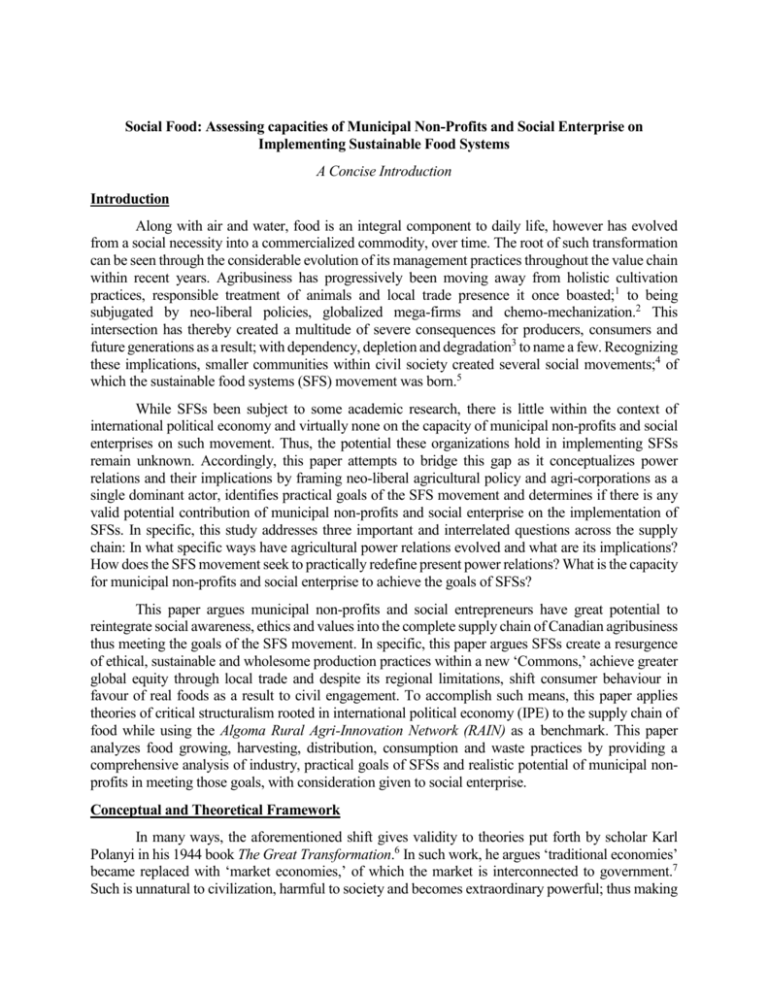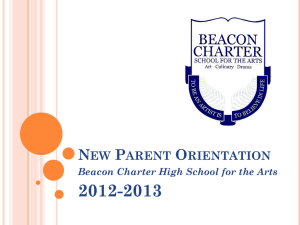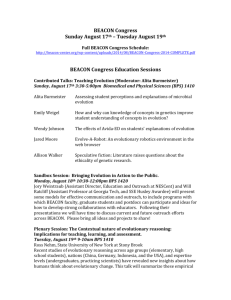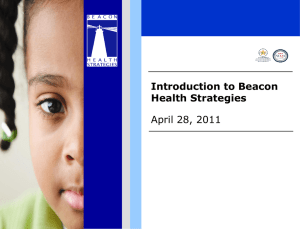AULT | Social Food: Assessing capacities of Municipal Non
advertisement

Social Food: Assessing capacities of Municipal Non-Profits and Social Enterprise on Implementing Sustainable Food Systems A Concise Introduction Introduction Along with air and water, food is an integral component to daily life, however has evolved from a social necessity into a commercialized commodity, over time. The root of such transformation can be seen through the considerable evolution of its management practices throughout the value chain within recent years. Agribusiness has progressively been moving away from holistic cultivation practices, responsible treatment of animals and local trade presence it once boasted;1 to being subjugated by neo-liberal policies, globalized mega-firms and chemo-mechanization.2 This intersection has thereby created a multitude of severe consequences for producers, consumers and future generations as a result; with dependency, depletion and degradation3 to name a few. Recognizing these implications, smaller communities within civil society created several social movements;4 of which the sustainable food systems (SFS) movement was born.5 While SFSs been subject to some academic research, there is little within the context of international political economy and virtually none on the capacity of municipal non-profits and social enterprises on such movement. Thus, the potential these organizations hold in implementing SFSs remain unknown. Accordingly, this paper attempts to bridge this gap as it conceptualizes power relations and their implications by framing neo-liberal agricultural policy and agri-corporations as a single dominant actor, identifies practical goals of the SFS movement and determines if there is any valid potential contribution of municipal non-profits and social enterprise on the implementation of SFSs. In specific, this study addresses three important and interrelated questions across the supply chain: In what specific ways have agricultural power relations evolved and what are its implications? How does the SFS movement seek to practically redefine present power relations? What is the capacity for municipal non-profits and social enterprise to achieve the goals of SFSs? This paper argues municipal non-profits and social entrepreneurs have great potential to reintegrate social awareness, ethics and values into the complete supply chain of Canadian agribusiness thus meeting the goals of the SFS movement. In specific, this paper argues SFSs create a resurgence of ethical, sustainable and wholesome production practices within a new ‘Commons,’ achieve greater global equity through local trade and despite its regional limitations, shift consumer behaviour in favour of real foods as a result to civil engagement. To accomplish such means, this paper applies theories of critical structuralism rooted in international political economy (IPE) to the supply chain of food while using the Algoma Rural Agri-Innovation Network (RAIN) as a benchmark. This paper analyzes food growing, harvesting, distribution, consumption and waste practices by providing a comprehensive analysis of industry, practical goals of SFSs and realistic potential of municipal nonprofits in meeting those goals, with consideration given to social enterprise. Conceptual and Theoretical Framework In many ways, the aforementioned shift gives validity to theories put forth by scholar Karl Polanyi in his 1944 book The Great Transformation.6 In such work, he argues ‘traditional economies’ became replaced with ‘market economies,’ of which the market is interconnected to government.7 Such is unnatural to civilization, harmful to society and becomes extraordinary powerful; thus making AULT | 2 a resurgence to the traditional economy only achievable through civil means.8 This forms the basis for of his most notable theory, ‘the double movement.’ Such theory states that markets which experience a shift in power from society toward business as a result of large government, known as the ‘first movement,’ become dis-embedded as society becomes subjected by industry, and is ultimately met with a second unplanned movement to reintegrate social control by civil society.9 Through this perspective, it is clear the food industry has transformed from being responsible to the customs and conventions of society to having society be responsive to it; and now such market control experiences an increasing threat of the sustainable food systems (SFS) movement. Municipal non-profits could be defined as non-profit organizations run privately and separately from the municipality itself though has a local mandate.10 This paper studies the case of Algoma District, Canada for its variance in its populations, geographies and cultures. In 1999, the Sault Ste. Marie Innovation Centre (SSMIC) was mandated to promote knowledge-based sectors in Algoma.11 In 2013, SSMIC partnered with Algoma University’s NORDIK Institute to develop the Algoma Rural Agri-Innovation Network (RAIN).12 This three-year project provides support for local actors within Algoma to facilitate economic and cultural sustainability in agriculture. Accordingly, they provide funding, conduct research and host community events aimed at increasing civil engagement within food.13 As seen through the mandate, projects and successes of RAIN, municipal non-profits play an active role in agribusiness and thus may have potential to implement SFSs in particular municipalities. New Contributions This research makes two new important contributions. First, it provides a refined overview of power relations as they relate to the industry of food. To this end, this paper frames the historical context, evolutionary shift and resurgence of the SFS movement in terms of power with civil society being in competition with a singular power entity of enterprise and government, though separates social entrepreneurship and municipal non-profits from such definition, respectively. This is to assess solely the effects of large enterprise and neo-liberal policies at the state level, for which involves significantly less civil relations by its very nature. Second, this research will determine if municipal non-profits and social enterprises in smaller metropolitan centers could reintegrate cultural, environmental and social sustainability in food through their engagements with the community and social entrepreneurs. If SFSs are to become a mainstream reality, it is important to understand the actors that drive their integration. Results from this analysis could then lead way to further research on assessing the extent to which these initiatives could integrate SFSs, and what limitations they may become subject to. Analysis and Discussion In what specific ways have agricultural power relations evolved and what are its implications? Karl Polanyi’s explanation of the Rise and Fall of Market Economies14 sheds light into the realm of where everything began, in the natural economy. This was the period in England during the 1700s, where commoners were lived just outside of the Lord’s castle on land given to them. Here, farmers grew their own food, built their own homes and exchanged their own ideas; making it a place of connection within but also protection from influence.15 Garrett Hardin describes this place as the ‘Commons,’ and suggests people had rights to the land for their own purposes.16 Polanyi describes how labour was not thought of, as individuals just worked the land; and money was only marginal to human society, as the Lords occasionally collected taxes, generally in terms of food, and hosted dinners as a result while storing some in case of invasion. It is in this place where Polanyi describes how social customs and conventions are truly upheld.17 With high civil engagement, society is largely embedded AULT | 3 in the traditional economy; considering what they ate, where their food came from and what its impact was on the land was well known; though the Enclosure Movement caused great change to this. During the Enclosure Movement, the ‘Commons’ became inaccessible with commodification of money, land and labour; ultimately giving way for modern markets.18 Polanyi argues these elements are not supposed to be commodities, as land and labour were not for sale in the Commons and money was only for tax purposes.19 Thus, he coins them as ‘fictitious commodities,’20 of which their emergence alters mechanisms of social relations.21 During the Enclosure Movement, power shifted from society to industry and laid the framework for the rise of markets and capitalism. It was treated as means to enlightenment with new ideas making work quicker and products greater in number.22 However, Polanyi describes the ultimate result as a loss of the traditional economy and civil control which results in a plethora of social problems.23 To this end are the underpinnings of globalization, neo-liberal trade policies and chemo-mechanized processes in the context of food. Hardin argues society gave up rights to the commons in exchange for distanced embedment,24 as synonymous to how Polanyi seen the alteration of social mechanisms. In present day food, an increasingly distant relationship between society and the market is present, as people become more dependent on the market economy. This distance allows the mega-corporations to increase in size and thereby increase the power of the state. Polanyi expressed belief that World War II would kill the market system,25 however in the years preceding that, corporations now dominate the globe in an astonishing display of power. Before the war, man-made chemicals were rarely employed within food production as farmers used the techniques of planting over crops, crop rotations and animal manure.26 However, the nitrogen made for bombs during the war continued to be produced for applications in growing practices of food.27 This then caused the ethical practices of farming to be forgotten. In Naomi Kline’s book, she describes how neo-liberal globalized corporate-dominate markets have grave consequences to society, though because of the markets power, deceives people into thinking they are a good thing. This can be seen through the effects of agri-chemicals.28 In the shortterm; greater use of fertilizers, pesticides and other chemicals are seen as enlightenment with greater yields, crop production and the “green revolution.”29 However, it actually lead to the greater use of harmful fertilizers which ultimately derailed marginal profits for the farmer, for the decreased soil fertility caused by the seeds and the increase of bugs and weeds appearing in the smaller places crops can now be grown.30 As a result to this, the environment becomes degraded with many of chemicals entering nearby lakes and rivers, effecting drinking water supply, wildlife and soil fertility.31 Moreover, these chemicals enter human bodies and correlate to severe health consequences as digestive systems are not adapted to these.32 With little social engagement, there is little awareness for the use of and associated harmful effects to pesticides used by profit-seeking companies. Distribution and food waste also have significance to the food system, as poverty and environmental degradation are resultant of the ‘market economy.’ One of the central themes to Polanyi’s explanation of the rise of market economies is the requirement for poverty and indifference to it by civil society for efficient markets as poverty is seen as a creation of markets.33 Presently, there is enough food to adequately feed everyone just as there is enough air for everyone to breathe; however because the market system is applied to food, one billion are left unfed primarily in developing nations while one billion are obese in Western nations.34 With neoliberal policies, firms gained power to purchase land in developing nation states and alter growing to one commodity, with little intervention.35 This was marketed as a good thing for ‘increased specialization’ on the world scale, however has led to severe poverty as their purchasing power becomes the supply and demand of that AULT | 4 one commodity, often given low prices in the world economy. Further, Polanyi suggests property rights are another essential feature of markets and leads to poverty.36 With Monsanto holding more patents than any other organization in agriculture and controlling of genetically their modified seeds, farmers are charged high prices which are to increase the yield, yet their effects of greater need for fertilizers often lead to a loss in overall profits.37 Through the framework of Polanyi, the ongoing economic displacement and environmental degradation are clearly resultant of globalization and neo-liberalism. Neoliberal governance, globalization and mega-corporations are clearly the root causes to the increasingly distanced relationship society has to their food, which allows corporations alter the growing, distribution and consumption of food. In terms of growing, the use nitrogen, pesticides and chemical modification lead to social unawareness, consequences to health and industrial control. For harvesting, unsustainable practices lead to environmental degradation often not thought by civil society. This unawareness of what is in food thus causes a distanced perception of consumption. Accordingly, it is thereby essential to frame the changes of supply chain management by recognizing government and market as a single entity, considering the global context and recognizing its interdependent relationship. Such policies were met with resistance back in Tudor England with classical Greece changing tenure and also must be occupied in the context of food. How does the SFS movement attempt to practically redefine present power relations? The ultimate goal of the SFS movement is to restore civil engagement in food by occupying its capitalist culture. Polanyi suggests market economies require imposition by civil society to restore traditional economic means38 as government and market are one entity. Noted through the earliest strategists, deception is a deep element of warfare.39 The film Food, Inc. showed society how food has become so corporatized consumers are insanely misled, and global trade lead to poverty not success.40 To re-embed food to society, capitalism must be occupied as it would be a fight against the ubiquitous corporate culture. Polanyi argues this culture lead to the depletion of natural resources in society,41 and must be reformed. According to the World Trade Commission on Environment and Development, sustainability is “meeting the needs of the current generation without compromising the ability of future generations to meet their own needs.”42 With sustainability in mind, Chez Panisse opened in France, and a surge of chefs wanting to source products from local farmers not using harmful chemicals followed, to prepare “real food.”43 To this end, many theories for civil resurgence been proposed. Multiple theories have suggested the goals of returning to sustainable food systems, yet only few are practical. Michael Pollen believes consumers should be aware of everything they put in their mouth.44 In specific, he believes people should see the animal, understand what it eats, where it goes and how it died before it eating it.45 Though ethical in theory, it is highly impractical to expect this. The Fraser Institute and the C.D. Howe Institute suggest greater privatization as a means, suggesting an increase in yield, greater efficiency with incentives of profit and further international trade would increase its accessibility.46 However, privatization thus far lead to the establishment of these problems; as such development foregoes real social, economic and environmental impacts. Douglas West provides some realistic expectations for the goals of sustainable food systems suggesting the Commons is not for sale, and greater civic engagement would lead to adequately consuming real foods.47 To this end, he provides a number of recommendations throughout the value chain. Changes to production may foods may be smaller in size, but their nutritional value and amount of actual product would increase while their negative externalities to the environment would be minimized.48 The ultimate origin of food comes from its growing, a process involving a mantra of people with 40% of the world’s population currently employed in it.49 This is at the heart of change in AULT | 5 the system and to this end, few practical changes leads make great difference. Using no chemicals in the growing, harvesting and marketing of food would thereby lead to the return of holistic food practices, decrease in demand for fertilizers and result in consumers eating less chemicals of which their bodies are not designed for. Moreover, drinking water, wildlife and the environment could all be benefit through less pesticides eroding into places where they become harmful. These practices, though hard to adopt in mega-farms, are easily adapted in small-scale farms. A key to Polanyi’s argument is that imposition must happen, regardless of its means.50 Local gardens and guerilla gardening are practical goals of the SFS movement that encourage civil engagement in the production of food.51 By producing things in local gardens, people know exactly the environment of the food, where it comes from and thereby will have better control over the growing behaviors within the crops themselves. Small-scale crops are essential to sustainability and one of the best way people can feed themselves.52 Moreover, with guerilla gardening, people have a purpose to not only foster their own engagement, but increase awareness of the origin of food. Furthermore, this concept contributes to community beatification as spaces otherwise unused become gardens, where people can participate in the planting care and harvesting of food.53 These community gardens go beyond the lowering of chemicals in food, and also make food more accessible, combatting food insecurity. The intersection of globalization, private enterprise and neo-liberal governance is also the root cause to why one billion people are obese, while one billion are food insecure. Eating local while thinking global is vital to sustainable distribution, and is built upon global interdependence theory. With diverse local crops, self-sufficiency is realized and the need for a global marketplace of food is downgraded to being peripheral with commodities only grown in specific areas. Globally developing nations could then gain greater food sovereignty through this localization process.54Local programs for equity in distribution also have significant impacts on targeting food insecurity of those domestically poor. Reverting waste of unqualified foods for the market, such as when a carrots too small to be sold in grocery stores, to community-based initiatives such as food banks or school programs, will not only limit waste but also feed many people.55 Developing comprehensive farmers’ markets and promoting them are key to shifting consumption patterns. As farmers sell direct-to-table, there is less of a need for preservatives. Farmers gain greater profit if they are able to sell direct to the consumer making this a true win-win. However, as noted by Sustain Ontario, there is a lack to develop infrastructure processing facilities and promote farmers’ markets to greater masses.56 Greater processing facilities locally will eliminate gas, time and retain greater earnings to local businesspeople and farmers, ultimately benefiting the communities to which they operate.57 With a 1000 mile-diet being implemented, many long-lasting social impacts can be avoided considering the global commons now accessible given the capacity to eat local. Consumption patterns must shift towards less meat consumption and greater consumption of plants. Presently, humans consume more meat than ever before.58 Meat has severe consequences to the environment, as the land they occupy has tremendous opportunity cost, and their lives become victim to unethical treatment because of profit-maximizing policies.59 It is important this be reduced with the promotion of pastured animals on local, small scale farms consumed far less during the day. Moreover, eating at home must occur more and there must be a resurgence of home economics; showing people how to garden, bake bread and harvest accordingly.60 With SFSs, consumption of less modified, more nutritious and wholesome food will be made possible. What is the capacity for municipally-supported projects and social enterprise to achieve such goals? AULT | 6 The approach of community economic development (CED) encompasses municipal nonprofits and social enterprises, and is key to civil engagement is for SFSs. As defined by Canadian CED Network, CED is “action by people locally to create economic opportunities and enhance quality of life in their communities on a sustainable and inclusive basis.”61 CED recognizes economic, environmental and social problems not otherwise addressed and collaborates with individuals, enterprises and communities to mend these problems.62 With a mission to “transform Ontario’s food systems together,” the Sustain Ontario network of municipal groups striving toward food education, development of farmers’ markets and composting programs.63 Through understanding the mandate, projects and accomplishments, it is clear CED organizations are capable of implementing SFSs. The Rural Agri-Innovation Network (RAIN) is a municipal non-profit aiming towards a more equitable, financially-viable and ecologically-sound food system in Algoma.64 To this end, it aims to integrate SFSs within the region. A practical goal of the SFS movement is to encourage small-scale production and holistic cultivation.65 To accomplish this, RAIN offers several funding programs for farms transitioning to these practices and increasing their overall capacity, covering up to 50% of contractor costs through grants in building infrastructure such as tile drainage.66 RAIN has a number of unique initiatives in addition, such as their program integrating Ontario-Works recipients to gain skills by working on local farms of which decreases need for pesticides. To truly enable small-scale production, RAIN also conducts research; specifically in the realm of possible future crops (such as canola, soybeans, quinoa and fruit) as well as pasture improvement and crop rotations. They then share this knowledge through a series of community workshops and information sessions.67 By increasing capacity for producers and processers, farmers realize greater profit than if selling to corporations.68 Local distribution constitutes great implications within tacking global poverty, and RAIN meets these goals by offering education of home economics, increasing awareness of local food and accessibility to farmers. In specific, RAIN hosted Sustain Algoma!, a one-day workshop where local individuals teach others how to bake, grow food and prepare meals in an environmentally-conscious manner.69 RAIN also maintains an online directory and marketplace of local farmers, and hosts an annual festival that celebrates “local food, farming and culinary traditions throughout the Algoma region” that lead in greater awareness and accessibility of local food. As seen through the various initiatives of RAIN, all issues regarding distribution and consumption of SFSs are addressed with the exception of waste, thereby implying great power to implement change by these organizations. Beyond stated practical ideas to implement SFSs, social entrepreneurship may yield significant capacity as it applies innovative, entrepreneurial activity with the goal of aiding social problems.70 RAIN recently partnered with NORDIK to found the Social Entrepreneurship Evolution (SEE), which boasts many clients taking innovative approaches to food.71 A client of the SEE, Cloverbelt Local Food Co-Op and Meats, solves local food delivery in remote regions in Northern Ontario through an online 1000-mile food market where it is ordered and subsequently delivered to the communities.72 This innovative business now grants access to local food whom otherwise didn’t. However, social enterprise is not simply limited to finding innovative programs, but also implementing change. Justus Veldman, a former refugee, purchased a condemned paper mill in Sault Ste. Marie in 2012. After applying for several grants, Veldman created a social enterprise empire, aimed at greater global equity.74 Not only did he create several accessible living-wage jobs, but implemented a widelysuccessful indoor farmers’ market called the ‘Mill Market.’ This project transformed how people shop within the city, as it is open multiple days a week with a really eclectic environment.75 Now, it has become a destination for consumers, chefs and farmers alike and has completely revitalized the farmers’ markets in the municipality. As seen through the mandate, projects and successes of RAIN 73 AULT | 7 and various social enterprises, it can therefore be concluded that municipal non-profits and social entrepreneurship has great capacity at implementing SFSs, and act as a strong “double movement.” Conclusion The results of this paper generally show there is great capacity of municipal non-profits and social enterprise to increase civil engagement in pursuit of obtaining sustainable food systems from the current food industry and its pervasive corporate culture. It is clear that, through a perspective of Karl Polanyi, power in agribusiness shifted from civil society to corporations which led to stronger Western state power on the global scale and higher rates of obesity, environmental degradation and poverty worldwide. Municipal non-profits and social enterprises focused on SFSs exist and perform well in meeting most practical goals of the sustainable food systems, as they aim to speed the transition in various communities. With strong alignment of the SFS goals, municipal non-profits have capacity to increase civil engagement while working with social enterprise to solve food security and eat local. There are several limitations to this study, however. First, as RAIN is in northern Ontario, many funding opportunities are more available because of the Northern Ontario Heritage Fund Corporation (NOHFC) which would thereby not be available for organizations elsewhere. Second, this organization is located in an agriculturally-rich region, not reflective of regional diversity within Canada. Lastly, the goals of the SFS movement outlined may be seen as too narrow as there are several organizations defining practical goals of SFSs. This study opens up many doors for further research. Power relations of the food industry should also be framed neo-gramscian terms by using Social Forces and World Order by R.W. Cox, to provide insights to the hegemonic powers of the state, particularly America, and its influence on the global industry of food. Other research should also explore the extent to which municipal non-profits and social enterprise could align with SFSs, and which initiatives have already been done that could act as a model to other communities. This study does, however, show that municipal organizations in general, do have capacity to implant goals of SFSs and social enterprise works in the furthering of this civil engagement and thus should not be overlooked nor downplayed within academia, government policy and social discourse. References "About Us." Sault Ste. Marie Innovation Centre. Accessed October 28, 2015. http://ssmic.com/index.cfm?fuseaction=content&menuid=18&pageid=1023. "About Us." Social Entrepreneurship Evolution. Accessed November 8, 2015. http://www.seethechange.ca/. "About Sustain Ontario." Sustain Ontario. Accessed November 9, 2015. http://sustainontario.com/about/about. Blay-Palmer, Alison. Food fears: from industrial to sustainable food systems. Ashgate Publishing, Ltd., 2008. Conway, Gordon. One billion hungry: can we feed the world?. Cornell University Press, 2012. Damalas, Christos A., and Ilias G. Eleftherohorinos. "Pesticide exposure, safety issues, and risk assessment indicators." International journal of environmental research and public health 8.5 (2011): 1402-1419. AULT | 8 De Bettignies, Jean-Etienne, and Thomas W. Ross. "The economics of public-private partnerships." Canadian Public Policy/Analyse de Politiques(2004): 135-154. Delgado, Christopher L. "Rising consumption of meat and milk in developing countries has created a new food revolution." The Journal of Nutrition 133.11 (2003): 3907S-3910S. Desmarais, Annette Aurélie. La Vía Campesina. John Wiley & Sons, Ltd, 2012. Friedmann, Harriet. "The political economy of food: the rise and fall of the postwar international food order." American Journal of Sociology (1982): S248-S286. Gliessman, Stephen R. Agroecology: researching the ecological basis for sustainable agriculture. Springer New York, 1990. Hardin, Garrett. The Tragedy of the Commons. Washington, D.C.: American Association for the Advancement of Science, 1968. "2015 Five Northern Leaders: Justus Veldman." Northern Ontario Business Magazine Established 1980. June 6, 2015. Accessed November 7, 2015. http://www.northernontariobusiness.com/featured-profiles/2015/01/2015-Five-NorthernLeaders--Justus-Veldman.aspx. Kenner, Robert, Richard Pearce, Eric Schlosser, Melissa Robledo, William Pohlad, Jeff Skoll, Robin Schorr, et al. 2009. Food, Inc. [Los Angeles, CA]: Magnolia Home Entertainment. Monteiro, Carlos Augusto, et al. "Increasing consumption of ultra-processed foods and likely impact on human health: evidence from Brazil." Public health nutrition 14.01 (2011): 5-13. McFetridge, D. G. "The Economics of Privatization." Nestle, Marion. "Reading the food social movement." World Lit Today 83.1 (2009): 37-39. Oerke, E-C., et al. Crop production and crop protection: estimated losses in major food and cash crops. Elsevier, 2012. Perrini, Francesco, and Clodia Vurro. "Social entrepreneurship: Innovation and social change across theory and practice." Social entrepreneurship 23.1 (2006): 57. Polanyi, Karl. The Great Transformation: The Political and Economic Origins of our Time. 2nd Beacon Paperback ed. Boston, MA: Beacon Press, 2001. Pollan, Michael. The omnivore's dilemma: a natural history of four meals. Penguin, 2006. Sell, Susan K. Private power, public law: the globalization of intellectual property rights. Vol. 88. Cambridge University Press, 2003. Rural Agri-Innovation Network (RAIN) | Building Relationships, Improving Capacity, and Undertaking Research for Northern Producers and Businesses. Accessed October 28, 2015. http://rainalgoma.ca/. “That's Truly a Local Product." Penokean Hills Farms. Accessed November 8, 2015. http://www.penokeanhillsfarms.com/. AULT | 9 Visser, Oane, and Max Spoor. "Land grabbing in post-Soviet Eurasia: the world’s largest agricultural land reserves at stake." The Journal of Peasant Studies 38.2 (2011): 299-323. "Welcome." Cloverbelt Local Food CoOp. Accessed November 1, 2015. http://cloverbeltlocalfoodcoop.com/. West, Douglas A.,"Chapter 2: Food Systems and Local Practice." U Miami Inter-American Law Review 43.137 (2011) "What Is CED?" What Is CED? Accessed November 7, 2015. https://ccednetrcdec.ca/en/what_is_ced. 1 Friedmann, Harriet. "The political economy of food: the rise and fall of the postwar international food order." American Journal of Sociology (1982): S248-S286. 2 Ibid 3 Ibid 4 Desmarais, Annette Aurélie. La Vía Campesina. John Wiley & Sons, Ltd, 2012. 5 Gliessman, Stephen R. Agroecology: researching the ecological basis for sustainable agriculture. Springer New York, 1990. 6 Polanyi, Karl. The Great Transformation: The Political and Economic Origins of our Time. 2nd Beacon Paperback ed. Boston, MA: Beacon Press, 2001. 7 Ibid 8 Ibid 9 Polanyi, Karl. "The self-regulating Market and the Fictitious Commodities." In The Great Transformation: The Political and Economic Origins of Our Time, 70. 2nd Beacon Paperback ed. Boston, MA: Beacon Press, 2001. 10 "What we do at RAIN." Rural Agri-Innovation Network (RAIN) | Building Relationships, Improving Capacity, and Undertaking Research for Northern Producers and Businesses. Accessed October 28, 2015. http://rainalgoma.ca/. 11 "About Us." Sault Ste. Marie Innovation Centre. Accessed October 28, 2015. http://ssmic.com/index.cfm?fuseaction=content&menuid=18&pageid=1023. 12 “About Us” NORDIK Institute – Algoma University’s Community Based Research Institute Accessed October 28, 2015 http://nordikinstitute.com/about-us-3 13 “About RAIN." Rural Agri-Innovation Network (RAIN) – About RAIN. Accessed October 28, 2015. http://rainalgoma.ca/rain-agriculture/. 14 Polanyi, Karl. "The Rise and Fall of the Market Economy." In The Great Transformation: The Political and Economic Origins of Our Time, 70. 2nd Beacon Paperback ed. Boston, MA: Beacon Press, 2001. 15 Hardin, Garrett. The Tragedy of the Commons. Washington, D.C.: American Association for the Advancement of Science, 1968. 16 Ibid 17 Polanyi, Karl. "The International System." In The Great Transformation: The Political and Economic Origins of Our Time, 2nd Beacon Paperback ed. Boston, MA: Beacon Press, 2001. 18 Polanyi, Karl. "The Rise and Fall of the Market Economy." In The Great Transformation: The Political and Economic Origins of Our Time, 35, 36, 37. 2nd Beacon Paperback ed. Boston, MA: Beacon Press, 2001. 19 Polanyi, Karl. "The Self-regulating Market and the Fictitious Commodities: Labor, Land and Money." In The Great Transformation: The Political and Economic Origins of Our Time, 72. 2nd Beacon Paperback ed. Boston, MA: Beacon Press, 2001. 20 Ibid 21 Ibid AULT | 10 22 Polanyi, Karl. "Birth of Liberal Creed." In The Great Transformation: The Political and Economic Origins of Our Time, 144. 2nd Beacon Paperback ed. Boston, MA: Beacon Press, 2001. 23 Polanyi, Karl. "Evolution of the Market Pattern." In The Great Transformation: The Political and Economic Origins of Our Time, 57. 2nd Beacon Paperback ed. Boston, MA: Beacon Press, 2001. 24 Ibid 25 Polanyi, Karl. "Conservative Twenties, Revolutionary Thirties." In The Great Transformation: The Political and Economic Origins of Our Time, 29. 2nd Beacon Paperback ed. Boston, MA: Beacon Press, 2001. 26 West, Douglas A.,"Chapter 2: Food Systems and Local Practice." U Miami Inter-American Law Review 43.137 (2011) 27 Oerke, E-C., et al. Crop production and crop protection: estimated losses in major food and cash crops. Elsevier, 2012. 28 Klein, Naomi. The shock doctrine: The rise of disaster capitalism. Macmillan, 2007. 29 Polanyi, Karl. "Birth of the Liberal creed." In The Great Transformation: The Political and Economic Origins of Our Time, 135. 2nd Beacon Paperback ed. Boston, MA: Beacon Press, 2001. 30 Oerke, E-C., et al. Crop production and crop protection: estimated losses in major food and cash crops. Elsevier, 2012. 31 Ibid. 32 Damalas, Christos A., and Ilias G. Eleftherohorinos. "Pesticide exposure, safety issues, and risk assessment indicators." International journal of environmental research and public health 8.5 (2011): 1402-1419. 33 Polanyi, Karl. "Conservative Twenties, Revolutionary Times." In The Great Transformation: The Political and Economic Origins of Our Time, 29. 2nd Beacon Paperback ed. Boston, MA: Beacon Press, 2001. 34 Conway, Gordon. One billion hungry: can we feed the world?. Cornell University Press, 2012. 35 Visser, Oane, and Max Spoor. "Land grabbing in post-Soviet Eurasia: the world’s largest agricultural land reserves at stake." The Journal of Peasant Studies 38.2 (2011): 299-323. 36 Polanyi, Karl. "Pauperism and Utopia." In The Great Transformation: The Political and Economic Origins of Our Time, 103. 2nd Beacon Paperback ed. Boston, MA: Beacon Press, 2001. 37 Sell, Susan K. Private power, public law: the globalization of intellectual property rights. Vol. 88. Cambridge University Press, 2003. 38 Polanyi, Karl. "The Self-regulating Market and the Fictitious Commodities." In The Great Transformation: The Political and Economic Origins of Our Time, 76. 2nd Beacon Paperback ed. Boston, MA: Beacon Press, 2001. 39 Polanyi, Karl. "Birth of the Liberal Creed." In The Great Transformation: The Political and Economic Origins of Our Time, 144. 2nd Beacon Paperback ed. Boston, MA: Beacon Press, 2001. 40 Kenner, Robert, Richard Pearce, Eric Schlosser, Melissa Robledo, William Pohlad, Jeff Skoll, Robin Schorr, et al. 2009. Food, Inc. [Los Angeles, CA]: Magnolia Home Entertainment. 41 Polanyi, Karl. "Market and Productive Organization." In The Great Transformation: The Political and Economic Origins of Our Time, 202. 2nd Beacon Paperback ed. Boston, MA: Beacon Press, 2001. 42 Polanyi, Karl. "The Hundred Years Peace." In The Great Transformation: The Political and Economic Origins of Our Time, 15. 2nd Beacon Paperback ed. Boston, MA: Beacon Press, 2001. 43 Nestle, Marion. "Reading the food social movement." World Lit Today 83.1 (2009): 37-39. 44 Pollan, Michael. The omnivore's dilemma: a natural history of four meals. Penguin, 2006. 45 Ibid 46 De Bettignies, Jean-Etienne, and Thomas W. Ross. "The economics of public-private partnerships." Canadian Public Policy/Analyse de Politiques(2004): 135-154. 47 West, Douglas A.,"Chapter 2: Food Systems and Local Practice." U Miami Inter-American Law Review 43.137 (2011) 48 Blay-Palmer, Alison. Food fears: from industrial to sustainable food systems. Ashgate Publishing, Ltd., 2008. 49 Ibid 50 Polanyi, Karl. "The self-regulating Market and the Fictitious Commodities." In The Great Transformation: The Political and Economic Origins of Our Time, 70. 2nd Beacon Paperback ed. Boston, MA: Beacon Press, 2001 AULT | 11 51 West, Douglas A.,"Chapter 2: Food Systems and Local Practice." U Miami Inter-American Law Review 43.137 (2011) 52 Ibid 53 Ibid 54 Ibid 55 Ibid 56 "About Sustain Ontario." Sustain Ontario. Accessed November 9, 2015. http://sustainontario.com/about/about. 57 West, Douglas A.,"Chapter 2: Food Systems and Local Practice." U Miami Inter-American Law Review 43.137 (2011) 58 Delgado, Christopher L. "Rising consumption of meat and milk in developing countries has created a new food revolution." The Journal of Nutrition 133.11 (2003): 3907S-3910S. 59 Monteiro, Carlos Augusto, et al. "Increasing consumption of ultra-processed foods and likely impact on human health: evidence from Brazil." Public health nutrition 14.01 (2011): 5-13. 60 West, Douglas A.,"Chapter 2: Food Systems and Local Practice." U Miami Inter-American Law Review 43.137 (2011) 61 "What Is CED?" What Is CED? Accessed November 10, 2015. https://ccednet-rcdec.ca/en/what_is_ced. 62 Ibid 63 "About Sustain Ontario." Sustain Ontario. Accessed November 9, 2015. http://sustainontario.com/about/about. 64 About RAIN." Rural Agri-Innovation Network (RAIN) – About RAIN. Accessed October 28, 2015. http://rainalgoma.ca/rain-agriculture/. 65 65 West, Douglas A."Chapter 2: Food Systems and Local Practice." U Miami Inter-American Law Review 43.137 (2011) 66 "Programs | Rural Agri-Innovation Network (RAIN)." Programs. Accessed November 9, 2015. http://rainalgoma.ca/programs/. 67 Ibid 68 “That's Truly a Local Product." Penokean Hills Farms. Accessed November 8, 2015. http://www.penokeanhillsfarms.com/. 69 "Programs | Rural Agri-Innovation Network (RAIN)." Programs. Accessed November 9, 2015. http://rainalgoma.ca/programs/. 70 Perrini, Francesco, and Clodia Vurro. "Social entrepreneurship: Innovation and social change across theory and practice." Social entrepreneurship 23.1 (2006): 57. 71 "About US." Social Entrepreneurship Evolution. Accessed November 8, 2015. http://www.seethechange.ca/. 72 "Welcome." Cloverbelt Local Food CoOp. Accessed November 1, 2015. http://cloverbeltlocalfoodcoop.com/. 73 Nobus/veld 74 "2015 Five Northern Leaders: Justus Veldman." Northern Ontario Business Magazine - Established 1980. June 6, 2015. Accessed December 16, 2015. http://www.northernontariobusiness.com/featured-profiles/2015/01/2015-FiveNorthern-Leaders--Justus-Veldman.aspx. 75 Ibid




